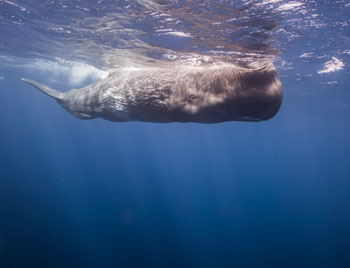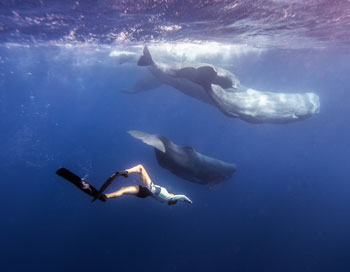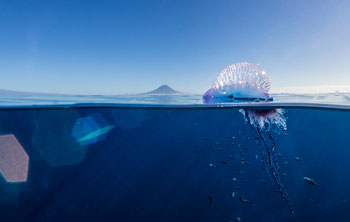Dr Chris Brown Azores Islands Photography Interview

Dr Chris Brown Azores Islands Photography Interview
Dr Chris Brown has just returned from 11 days in the depths of the Atlantic Ocean trying to capture awe-inspiring images of sperm whales – one of the shiest, most mysterious creatures in the world.
Interview with Dr Chris Brown, Canon Ambassador
Question: Can you tell us a little bit about your 11-day journey capturing sperm whales on film?
Dr Chris Brown: I teamed up with Canon Master, Krystle Wright, with the idea of creating a film together highlighting the adventure of us capturing an iconic image of one of the world's most mysterious whales – the Sperm Whale. We travelled to the Azores during September last year, and realised early on just how beautiful the islands are. It's hard to explain, the Azores feel like a volcanic time capsule that's floated to the surface in the middle of the Atlantic Ocean.
The first five days, we didn't encounter a single whale, even though there had been numerous whale sightings before we'd arrived. Photographing and filming animals is often a waiting game, and takes a great deal of patience, however we were there for such a short time that we were definitely getting a little nervous.
 Question: What Canon products did you use during this adventure?
Question: What Canon products did you use during this adventure?
Dr Chris Brown: I've been shooting with Canon products for a very long time, and now I'm lucky enough to be an ambassador for them. Now I shoot on the Canon EOS 1DX, and on this trip I also used an EOS 5DS for some of the shots. The film was also all shot on Canon – the 1DX Mark II.
Question: Can you tell us how and why you dived without scuba gear?
Dr Chris Brown: Sperm Whales are incredibly shy. The bubbles scare off the whales so it was just my lungs up against a whale that can easily hold their breath for 45 minutes, we kept relatively close to the surface for lighting reasons also.
Question: Why is extreme patience needed to photograph animals, like the sperm whale?
Dr Chris Brown: With thousands of metres of volcano towering above you, thousands of metres of water under you and thousands of kilometres of ocean around you, the chances of -arranging' an encounter with an Azorean local at a mutually agreeable location are slim. You've just got to hope that some luck shines down on you.
If it wasn't already a challenge, if Sperm Whales don't like you, they disappear. And seriously disappear. Almost 2500m down into the deep blue water. There's not even any light past 900m so when they want to avoid the spotlight they can really do it.
You just have to be really patient and take measures such as not using scuba gear as the bubbles would scare them away.
 Question: What was it like feeling the -clicks' of the sperm whales underwater?
Question: What was it like feeling the -clicks' of the sperm whales underwater? Dr Chris Brown: After I was dropped in the water were we had seen our first -blow', the others sped off in a direction of another sighting and left me behind. Then, the eeriest thing happened. I began to feel the communication -clicks' of a whale. Thinking I was imagining it, I stuck my head under and they were certainly coming in fast and loud. A few seconds later, through the blue, I saw the most remarkable sight. A 25 metre long sperm whale sped through the water like a submarine, arcing and fixing that big eye on me as he passed.
Question: What did you learn about whales whilst in the depths of the Atlantic Ocean?
Dr Chris Brown: Those quiet days on the ocean actually left me even more intrigued by the social structure of these whales. What event had caused every single sperm whale to disappear from our island and congregate elsewhere? A feeding frenzy? A birth? Or perhaps a death in the family? Whatever it was, the first sighting of the whales after this event saw the most peculiar bonding moments. Up to 10 sperm whales were swimming in formation and then spending long periods of time gently caressing each other. It really got me thinking whether their concept of family is perhaps stronger than ours.
Question: What was it like working with extreme sports photographer, Krystle Wright?
Dr Chris Brown: Krystle has such an incredible appetite for adventure. She somehow sniffs out a challenge that's physical and spectacular and immediately you see her spring into action; planning how she can create the ultimate image for the occasion. Her enthusiasm for a concept is infectious so I knew that presenting her with this idea was always going to make for a memorable trip.
 Dr Chris Brown: I really love the film that we created. It captures the quirkiness of the islands and really reflects how we were feeling.
Dr Chris Brown: I really love the film that we created. It captures the quirkiness of the islands and really reflects how we were feeling. I have attached some of my favourite images. I managed to capture the moment I mentioned before about my first encounter and am incredibly proud of it. That image will stay with me for a lifetime.
Question: What are some of the misconceptions and misunderstanding of whales as a species?
Dr Chris Brown: Sperm Whales have a reputation of being an aggressive animal. One of the biggest reason for the trip was to see if this rumour was justifies or just the stuff of legend.
Literature, like Moby Dick, is just one tale that litters the history books, depicting sperm whales as killers capable of ramming ships to sink them.
Interview by Brooke Hunter
Have You Seen This?
MORE




